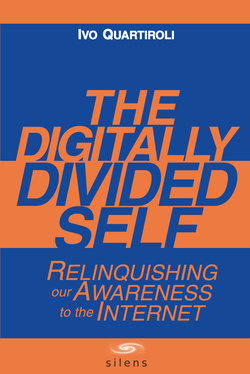Читать книгу The Digitally Divided Self: Relinquishing our Awareness to the Internet - Ivo Ph.D. Quartiroli - Страница 30
На сайте Литреса книга снята с продажи.
Pure Thinking Without the Body
ОглавлениеFor reasons similar to those which gave technology so much power, we have become disconnected from close, felt connection with our bodies. A sort of Cartesian “pure thinking” has taken precedence over other cognitive modalities.
When the first virtual systems appeared in the 1990s, Mark Slouka (1995) wrote that the context provided by the physical world enables us to judge good and bad. Birth, pain, pleasure and death provide the ground for judging what is preferable. By contrast, virtual systems give a reality divorced from the world, offering a view into a universe with no ethical ground.
The digital environment is basically disembodied. The body has a marginal role – or may even be seen as a hindrance. The roots of this attitude are to be found in the Judeo-Christian tradition which exiled the body to a role far from the divine – the very root of all sin. Our market society is recovering the body almost exclusively in hedonistic terms. Knowledge of our body translated into technical terms comes down to: What heart rate do I need to burn fat on the treadmill? What scores on my medical tests assure me I’m healthy? How can I improve my body-mind with certain chemicals? How can I re-engineer myself through genetic technology?
The relationship with the body easily turns digital when we approach it from outside, without felt connections. Bodies today are managed by technologies – from birth through our last breath. Several studies point out that proper brain development requires a baby to be in touch with the mother’s breast, receiving stimulation from both the environment and from appropriate human contact. If deprived of these, intelligence and social skills will not develop correctly. Later the ego-mind is left to recapture something which only the heart, body, and awareness can.
The Western culture, in devaluing the body, negated as well the very roots of compassion which is felt in the intersection of body, mind, sensations, and ethical values. It is hard to feel compassion and empathy when there is no connection with an embodied reality. We thus remain unconcerned when the media show people being killed. Repeated exposure to virtuality can weaken our capacity for participation. Laing (1959) said, “the person who does not act in reality and only acts in fantasy becomes himself unreal” (p. 85).
Jerry Mander (1978), in his classic Four Arguments for the Elimination of Television, quoted an experience of journalist Jane Margold who entered a “mediated” version of a dramatic experience: “This is real; there’s a wounded man lying here in front of me, bleeding to death, yet I have no feeling. It seems like a movie” (p. 236).
In negating the role of the body as a bridge to our soul, compassion becomes merely a mental state. Snatched away from our totality, compassion can then fit on Facebook with the hugging of a teddy bear, or writing “Hope you get better.”
